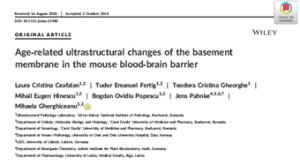The EU Joint Programme on Neurodegenerative Disease Research (JPND) has awarded funding to ten multi-national research teams in order to increase understanding of the factors that contribute to the quality and delivery of health and social care for neurodegenerative diseases.
Current research suggests strong potential for improving quality of life for those living with neurodegenerative diseases such as Alzheimer’s disease and Parkinson’s disease, with novel health and social care concepts and innovations focusing on the preservation of dignity, independence and social inclusion. Nevertheless, the availability and quality of such services vary considerably across Europe and beyond.
JPND has selected ten teams with ambitious, innovative and multi-disciplinary collaborative projects that address health and social care at both the macro level of systems and infrastructures and the individual level of patients, carers and families.
“While waiting for new treatments to emerge from basic and translational research, we need to support projects that could deliver immediate impactful developments which health and social care research and innovation may be able to achieve. This includes new insights that point to the potential for improved patient empowerment, civic participation and quality of life,” said Professor Philippe Amouyel, Chair of JPND. “Our hope is that this work will lead to the adoption of novel health promotion strategies that will reduce the impact of disease for patients as well as for their families and carers.”
The ten projects were recommended for funding by an independent, international Peer Review Panel based on scientific excellence with input from the JPND advisory board on patient and public involvement. Proposals are presented in alphabetical order according to their acronym.
Visit the call page here.
ADDITION
Alzheimer’s disease data-driven insights on individual outcomes of importance
Coordinator:
Linus Jönsson, Karolinska Institutet, Sweden
Partners:
Wiesje van der Flier, VU University Medical Center, The Netherlands
Carole Dufouil, INSERM, University of Bordeaux, France
COGNISANCE
CO-desiGning demeNtia dIagnoSis ANd post-diagnostic CarE
Coordinator:
Henry Brodaty, University of New South Wales, Australia
Partners:
Lee-Fay Low, University of Sydney, Australia
Isabelle Vedell, McGill University, Canada
Frans Verhey F, Maastricht University, The Netherlands
Greta Rait, University College London, United Kingdom
Louise Robinson, Newcastle University Institute for Ageing, United Kingdom
Joanna Rymaszewska, Wroclaw Medical University, Poland
DOMINO-HD
Multi-Domain Lifestyle Targets for Improving ProgNOsis in Huntington’s Disease
Coordinator:
Monica Busse, Centre for Trials Research, Cardiff University, United Kingdom
Partners:
Madeleine Lowery, Insight Centre for Data Analytics, University College Dublin, Ireland
Esther Cubo, Hospital Universitario of Burgos, Spain
Grzegorz Witkowski, Institute of Psychiatry and Neurology, Warsaw, Poland
Bernhard Landwehrmeyer, University of Ulm, Germany
Hans Jung, University of Zurich, Switzerland
FCDS Study
Scaling up the Family Carer Decision Support Intervention: A transnational effectiveness-implementation evaluation
Coordinator:
Kevin Brazil, Queen’s University Belfast, United Kingdom
Partners:
Sharon Kaasalainen, McMaster University, Canada
Jenny van der Steen, Leiden University Medical Centre, The Netherlands
Nicola Cornally, University College Cork, Republic of Ireland
Martin Loucka, Center for Palliative Care, Czech Republic
HEALTHE-RND
European eHealth care model for rare neurodegenerative diseases
Coordinator:
Jiri Klempir, Charles University in Prague, Czech Republic
Partners:
Jennifer Hoblyn, Bloomfield Hospital, Trinity College Dublin, Ireland
Ferdinando Squitieri, Huntington and Rare Diseases Unit, IRCCS Casa Sollievo della Sofferenza Hospital, Italy
Wilco Achterberg, Leiden University Medical Center, Topaz Huntington Center Overduin, The Netherlands
Niels Chavannes, Leiden University Medical Center, Department of Public Health and Primary Care, The Netherlands
Bernhard Landwehrmeyer, University of Ulm, Germany
Stephen P McKenna, Galen Research, Manchester, United Kingdom
HOMESIDE
A HOME-based Spousal caregiver-delivered music Intervention for people living with DEmentia: A Randomised Controlled Trial
Coordinator:
Felicity Baker, The University of Melbourne, Australia
Partners:
Karette Stensæth, Norwegian Academy of Music, Norway
Helen Odell-Miller, Anglia Ruskin University, United Kingdom
Thomas Wosch, University of Applied Sciences Würzburg-Schweinfurt, Germany
Anna Bukowska, University of Physical Education in Krakow, Poland
iCARE-PD
Integrated Parkinson Care Networks: addressing complex care in Parkinson disease in contemporary society
Coordinator:
Tiago Mestre, The Ottawa Hospital Research Institute / University of Ottawa, Canada
Partners:
Carsten Eggers, Philipps University of Marburg, Germany
Álvaro Sanchez-Ferro, Fundación Investigación HM Hospitales, Spain
Olivier Rascol, Toulouse University Hospital, France
Timothy Lynch, The Mater Misericordiae University Hospital, Ireland
Evžen Růžička, Charles University, Czech Republic
OPTIM-PARK
Optimization of community resources and systems of support to enhance the process of living with Parkinson’s Disease: a multisectoral intervention
Coordinator:
Maria Carmen Portillo, University of Southampton, United Kingdom
Partners:
Maria Victoria Navarta, University of Navarra, Spain
Lydia López Manzanares, Hospital Universitario de la Princesa, Spain
Christina Foss, University of Oslo, Norway
Anita Haahr, VIA University College, Denmark
SHAPE
Self-management and HeAlth Promotion in Early-stage dementia with e-learning for carers – A randomised controlled trial
Coordinator:
Ingelin Testad, Stavanger University Hospital, Norway
Partners:
Geir Selbæk, Norwegian National Advisory Unit on Ageing and Health, Norway
Linda Clare, University of Exeter, United Kingdom
Martin Knapp, London School of Economics & Political Science, United Kingdom
Kaarin Anstey, University of New South Wales, Australia
SHARED
Social Health And Reserve in the Dementia patient journey
Coordinator:
Arfan Ikram, Erasmus MC Rotterdam, The Netherlands
Partners:
René Melis, Radboud UMC, The Netherlands
Anna-Karin Welmer, Karolinska Institutet, Sweden
Henry Brodaty, University of New South Wales, Australia
Daniel Davis, University College London, United Kingdom
Karin Wolf-Ostermann, University of Bremen, Germany
Joanna Rymaszewska, Wroclaw Medical University, Poland

